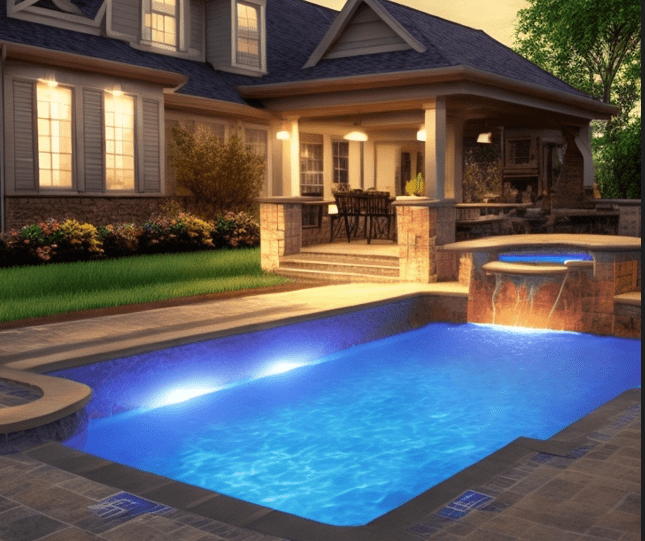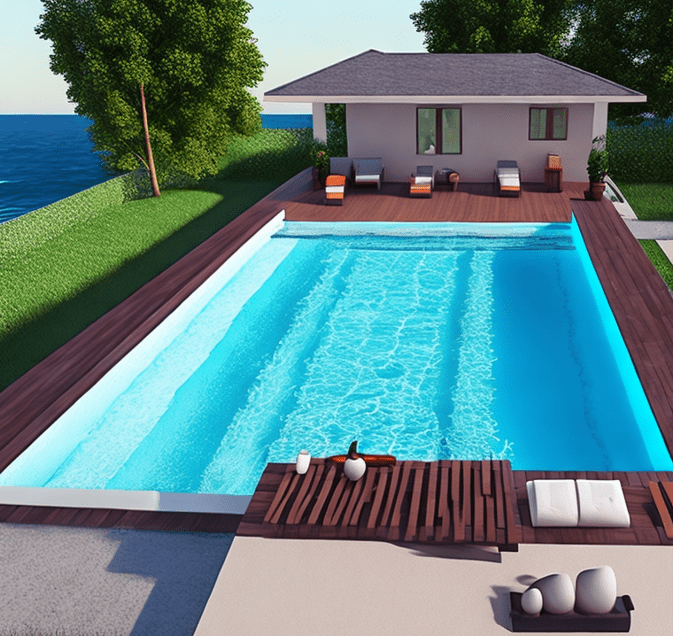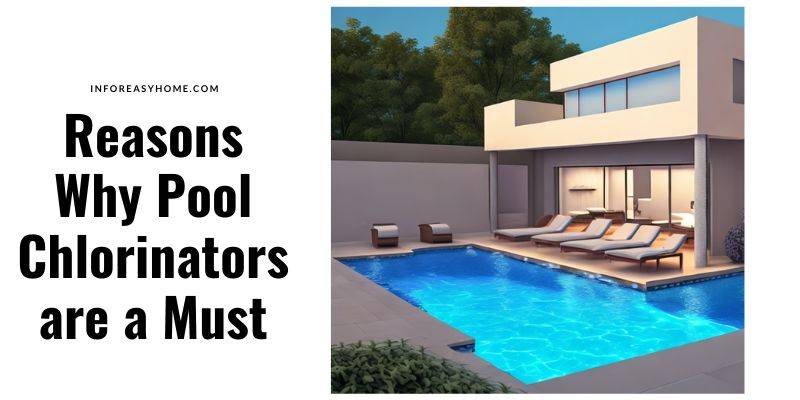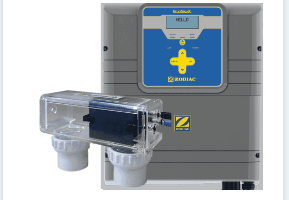Maintaining proper pool sanitation is crucial for the health and enjoyment of swimmers. One essential tool for achieving this is a pool chlorinator.
Chlorinators are designed to distribute chlorine in a controlled manner, ensuring that your in-ground pool remains clean, clear, and safe to swim in.
In this article, we will explore ten compelling reasons why pool chlorinators are a must-have for in-ground pools.
1. Efficient and Convenient Chlorine Distribution
Pool chlorinators automate the distribution of chlorine into your pool water, eliminating the need for manual dosing. This saves you time and effort while ensuring a consistent and even spread of chlorine throughout the pool.
look also, Best Chlorinator for In-ground Pools
2. Consistent Sanitation Levels

Maintaining a consistent level of chlorine in your pool is essential for preventing the growth of harmful bacteria, algae, and other contaminants. Chlorinators help to achieve this by releasing a steady supply of chlorine, keeping your water sanitized and safe.
3. Adjustable Chlorine Output
Different weather conditions, pool usage, and water temperatures may require varying chlorine levels. Chlorinators offer adjustable settings, allowing you to control the amount of chlorine being dispersed. This flexibility ensures that your pool always has the optimal chlorine level for effective sanitation.
4. Extended Chlorine Lifespan
Chlorinators can extend the lifespan of chlorine by utilizing a slow-release mechanism. This prevents chlorine from being quickly consumed or degraded by sunlight, heat, or heavy pool usage. As a result, you will save money on chlorine expenses and reduce the frequency of adding chlorine to your pool.
5. Reduced Chlorine Odor and Eye Irritation
When chlorine levels are inconsistently managed or manually added in excess, it can lead to strong chlorine odors and eye irritation for swimmers. By using a chlorinator to maintain a steady and appropriate chlorine level, you can significantly reduce these undesirable effects, creating a more pleasant swimming experience.
6. Algae Prevention
The algae growth can turn a sparkling pool into a green and slimy mess. Chlorinators work continuously to inhibit the growth of algae, preventing it from taking hold and keeping your pool water crystal clear.
7. Time-Saving and Low Maintenance
Chlorinators are designed to be low maintenance, requiring minimal effort and attention. Once properly installed, they operate automatically, freeing up your time to enjoy your pool rather than spending it on manual chlorine maintenance.
8. Cost-Effective
Though pool chlorinators may require an initial investment, they prove to be cost-effective in the long run. By extending the lifespan of chlorine, reducing the need for additional chemicals, and preventing expensive pool problems such as algae outbreaks, chlorinators can save you money on pool maintenance expenses.
9. Compatible with Saltwater Pools
If you have a saltwater pool, a saltwater chlorinator can be an excellent addition. These chlorinators use salt to generate chlorine, providing a gentler and more natural pool sanitation experience. They are specifically designed to handle the demands of saltwater systems.
10. Enhanced Water Quality and Swimmer Safety

Ultimately, the primary goal of a pool chlorinator is to ensure the water in your in-ground pool is of high quality and safe for swimmers. By keeping the chlorine level consistent, preventing algae growth, and minimizing contaminants, chlorinators contribute to a clean, healthy, and enjoyable swimming environment.
Conclusion
Investing in a pool chlorinator for your in-ground pool is a wise decision that offers numerous benefits. From efficient and consistent chlorine distribution to cost savings and improved water quality, chlorinators play a vital role in maintaining a clean and safe swimming pool.
Here are related articles you can read: Best Automatic Chlorinator for In-ground Pools
FAQ:
Q1: How does a pool chlorinator work?
A pool chlorinator is connected to the pool’s filtration system and uses either tablets or liquid chlorine. It releases a controlled amount of chlorine into the pool water, ensuring consistent sanitation levels.
Q2: Can I adjust the chlorine output of a pool chlorinator?
Yes, most pool chlorinators have adjustable settings that allow you to control the amount of chlorine being dispersed. This feature enables you to adapt to different conditions and maintain optimal chlorine levels.
Q3: Will using a pool chlorinator reduces chlorine odor and eye irritation?
Yes, by maintaining a steady and appropriate chlorine level, a pool chlorinator can significantly reduce chlorine odors and eye irritation often associated with inconsistent chlorine management.
Q4: Do pool chlorinators prevent algae growth?
Yes, pool chlorinators work continuously to inhibit the growth of algae, helping to keep your pool water clear and free from green and slimy outbreaks.
Q5: Are pool chlorinators suitable for saltwater pools?
Yes, there are specific chlorinators designed for saltwater pools. Saltwater chlorinators use salt to generate chlorine, providing a gentler and more natural sanitation experience for saltwater pool owners.
Q6: Are pool chlorinators cost-effective?
Yes, pool chlorinators can be cost-effective in the long run. By extending the lifespan of chlorine, reducing the need for additional chemicals, and preventing costly pool problems, they can save you money on maintenance expenses.
Q7: How often do I need to maintain a pool chlorinator?
Pool chlorinators are designed to be low maintenance. Regular checks and cleaning are recommended, but they typically require minimal effort and attention once properly installed.
Q8: Can a pool chlorinator be used in all in-ground pools?
Yes, pool chlorinators are compatible with most in-ground pools.
Q9: Can a pool chlorinator replace regular pool maintenance?
While pool chlorinators automate chlorine distribution, they are not a complete substitute for regular pool maintenance. You should still monitor and balance other pool chemical levels, clean the pool, and maintain the filtration system.
Q10: Can I install a pool chlorinator myself, or do I need professional assistance?
The installation process may vary depending on the chlorinator model and your pool system. Some pool owners can install chlorinators themselves, while others may prefer professional assistance to ensure proper installation and integration with the pool system.
- 15 Must-Have Products to Start Your Cozy Outdoor Kitchen - July 15, 2025
- 30 Cozy Outdoor Kitchen Ideas You Can Try in Any Backyard - July 14, 2025
- 27 Cozy Dark Bedroom Inspiration Ideas for Warm and Relaxing - July 13, 2025


